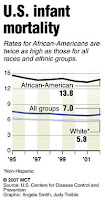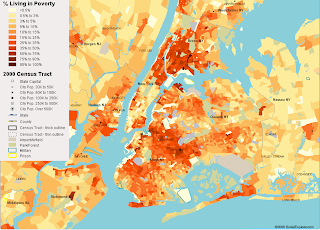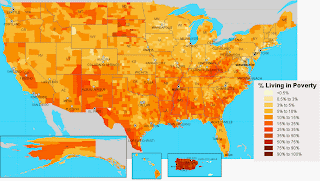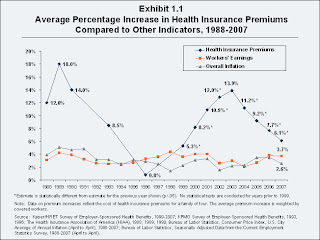Saturday, September 29, 2007
Infant Mortality and Race

From McClatchy
Black infant mortality is a complicated puzzle that includes poverty, poor nutrition, inadequate prenatal care, teen pregnancy, heredity, high blood pressure, stress, obesity, low birth weights and prematurity. However, some neonatologists and child health advocates have pushed for more research to get behind the social reasons why these factors seem to take a higher toll on African-American infants than they do on other babies.
.....
Though the infant mortality rate for all races has decreased over the past two decades, the United States still has one of the highest rates among developed nations. In this country, the infant mortality rate for black babies is 13.5 per 1,000 live births, compared with roughly 5.7 for whites and Hispanics, according to statistics from the Centers for Disease Control and Prevention.The problem is especially acute in rural areas such as Mississippi's Delta region along U.S. 61, and urban centers such as Washington, D.C., and Memphis, Tenn. — which has a zip code where the infant mortality rate is higher than those of many Third World nations.
Thursday, September 27, 2007
No Needy Among You?
JCPA LAUNCHES NATIONAL ANTI-POVERTY CAMPAIGN:
“THERE SHALL BE NO NEEDY AMONG YOU”
“Let the sound of the shofar shatter our complacency” (Mahzor)
On September 18th, the Jewish Council for Public Affairs launched its national anti-poverty campaign, “There shall be no needy among you”, at a press conference in the nation’s Capitol.
JCPA Executive Director, Rabbi Steve Gutow was joined at the podium by Representatives Jim McGovern and Jo Ann Emerson (co-chairs of the Congressional Hunger Caucus), as well as Representatives Tim Ryan, Chris Van Hollen, and Keith Ellison. Representatives Ryan, Emerson and McGovern took the food stamp challenge in May, and Representative Van Hollen will do so in October. It was Congressman Ellison, the only Muslim member of Congress, who joined us in taking the food stamp challenge right now. For Jews, this time between Rosh HaShana and Yom Kippur holds special meaning. For Muslims it is Ramadan. Bringing these two faith perspectives together to highlight the moral imperative to combat hunger was perhaps the highlight of the press conference. . . .
Wednesday, September 26, 2007
Post-Ahmadinejad Political Opportunism Rant
Is there anything more transparent or absurd than our cheerleading warriors pretending to be concerned about gay Iranians? Mysteriously, they are silent about gays in Uganda, where homosexuality is a crime punishable with imprisonment, and silent about Zimbabwe, where President Robert Mugabe has called homosexuals "worse than dogs and pigs" and routinely imprisons them. Gay Africans are widely oppressed -- including arrests, beatings and governmental attacks -- in numerous sub-Saharan countries, and our brave warrior class says nothing.
Gays in many other Muslim countries, including U.S. allies such as Egypt and the UAE, are treated brutally and oppressively. In Iraq, the country we Liberated, the government we support is involved in numerous violent attacks on gay Iraqis, and our ally, Shiite Ayatollah Ali Sistani, issued a fatwa "forbidding homosexuality and declaring that gays and lesbians should be 'punished, in fact, killed.'"
And in countries too numerous to count, including nations such as Jamaica right here in the U.S. sphere of interest, gay people are forced to remain invisible lest they be the subject of arrest and violent attack. Yet somehow, our bloodthirsty tough guys/new-gay-rights-crusaders could not be any less interested in the plight of gay people in these countries, where they have no interest (currently) in sending their fellow citizens to wage war for them.
And all of this is to say nothing of the measures their own political party supports right here in the freedom-loving U.S. While no rational person would compare the life of gay people in America to gays in Iran and many other nations, the fact is that the U.S. continues to have some of the most reprobate and oppressive anti-gay laws in the Western World, laws supported by the political faction pretending now to be so deeply concerned about the plight of gay Iranians.
In particular, the Defense of Marriage Act prohibits any recognition of gay relationships for immigration purposes, thus forcing many American citizens either to live outside of their own country to be with their partner or live in separation from the person with whom they want to spend their lives. Not only European countries, but numerous developing countries, now recognize gay relationships for immigration purposes (.pdf) because they refuse to place their gay citizens in that wrenching predicament.
Even more reprehensibly, the U.S. remains one of the only Western countries to ban anyone with HIV from immigrating to this country. Efforts to repeal both laws have been repeatedly blocked by the political party to which our warrior/gay-rights-crusaders pledge their allegiance. And that same political party happily continued its alliance with the likes of Jerry Falwell and Pat Robertson even after they both blamed the 9/11 attacks on gay rights. And as Juan Cole documents, as we all scoff at the primitive ignorance of Ahmadinejad, we tolerate quite similar sentiments among some of our most respected political figures.
Tuesday, September 25, 2007
"Memory -- Virtue's First Line of Defense"
Update I: More on Bollinger and consistency here
Update II: Iranian University Presidents take a turn
Monday, September 24, 2007
A Lovely Tribute
Sunday, September 23, 2007
Saturday, September 22, 2007
Friday, September 21, 2007
Race and the Presidency?
Over at Tapped, Kate does some interesting work collecting the statements of presidential candidates on the Jena 6, and evaluating how they differ from Obama's. As she concludes, "words that Obama can't use include, but are not limited to: segregation, black, white, racism, criminal justice system, racial tension, and intolerance. He has to temper his statement as an inclusive, all-humanity call to action against injustice, rather than a call to action against a criminal justice system that is inherently racist and a white-dominated society where cases like Jena are still too-common."
I remember being in New Orleans for John Edwards' presidential announcement. He stood in a muddy backyard in New Orleans' 9th Ward, before a tableau of African-American children bussed in by the NAACP. One reporter wondered whether Obama could have announced his campaign in such an overtly racialized setting. "No," agreed the assemblage. That's the fun thing about running for President as a black man: You have to convince the electorate that you never really noticed you were a black man.
Homelessness? Start with Housing.
Abstract: The Skid Row Collaborative (SRC) is one of 11 projects funded in fall 2003 under the Chronic Homelessness Initiative (CHI) in fall 2003 to demonstrate the feasibility of moving chronically homeless disabled people directly into housing and helping them retain housing with health, mental health, substance abuse, and other supportive services. With much higher housing retention at the three-year milestone than a comparison group (59 vs. 14 percent), the SRC has proved to be a successful model of housing plus services for the Skid Row population—a model that could be adopted more widely in Skid Row and beyond.
Wednesday, September 19, 2007
Tuesday, September 18, 2007
The Clinton Health Plan
Thursday, September 13, 2007
Investing in Children
Between 2006 and 2017, the share of the budget pie that the federal government will invest in children is projected to decline by 14 to 29 percent. Forecasts of federal government spending indicate that over the same period annual domestic spending will rise by approximately $650 billion in real dollar terms, but investments in children will garner nearly none of this increase. The United States budget is increasingly oriented toward consumption-based programs and less oriented to those investments aimed at enhancing economic growth.Read the report with THIS recent post in mind?
Wednesday, September 12, 2007
Here We Go Again
I’ll try to find time for a longer post and a more comprehensive analysis of the Report, but it’s a rather intellectually dishonest sort of exercise, one full of Straw Men, and it’s hard to know where to begin. A few first thoughts:
Standard 6.01 of the NASW Code of Ethics is not, as the NAS claims, a “partisan declaration.” Here’s the text:
Social workers should promote the general welfare of society, from local to global levels, and the development of people, their communities, and their environments. Social workers should advocate for living conditions conducive to the fulfillment of basic human needs and should promote social, economic, political, and cultural values and institutions that are compatible with the realization of social justice.To insist that social workers respect the dignity of all people, and seek to find ways on the micro- and the macro-level to improve their clients’ lives, including (gasp!) through political action, is not a partisan declaration. Nor is, I would hope, an injunction against discrimination on the basis of race, or disability, or sexual orientation. Unless you believe that principles of equality, justice, fairness, and respect for human dignity and difference are the province only of one political party. Or that a call to engage in politics is subversive of democracy itself.
They complain about courses and instructors that “grant a privileged status to a single, arguable view, which is thereby placed above critical examination.” Set aside the clever trick of inserting the word “arguable” here. What they describe is indoctrination and hectoring, not teaching. We could with too little effort, alas, come up with examples of bad teaching, and the academy does not do enough to avoid that (in no small part because of pressures to save costs and reduce faculty power by off-loading courses to under-qualified, under-mentored adjuncts with too little experience in the classroom). But who do you know who celebrates this approach? Who walks into the classroom with the goal to cajole or convert? The plural of "anecdote" is not, contrary to an old saw, "data." Is bad teaching a problem in social work schools? Yes, as it is wherever it occurs. Are such practices widespread? They offer no evidence that it is.
NAS hauls out Nozick and Rawls to argue that ideas of “justice” are contested. Well, of course they are. But when a student in a social work classroom talks about a client who was evicted from her subsidized apartment with her two small children because she never received, and therefore never returned, the paperwork required to keep her there, I can assure you that the room will have little debate about whether this as unjust. Part of what our job is is to teach students how they can effectively intervene – first by making sure their client has shelter, and, perhaps, then by working at the agency, city, state or even national level to get such arbitrary policies changed. Is this ideological? Social Work students are not doctoral candidates in political philosophy, and while Rawls may have his uses, they are being trained to deal with a grim reality, not lofty abstractions. They are men and women who have, usually quite consciously, decided to sacrifice prestige and high wages in favor of making life a little less grueling for Americans with the least political and economic power. Is a determination to reduce misery and suffering partisan? I hope not.
The NAS approach, like the worst habits of “professional” journalism, seems also to imply a naive standard of “objectivity” that means that: there are two (and seldom more than two?) views to any issue; they are equally powerful as explanations; and that the educator’s job is to present divergent viewpoints and then leave it to students to pick among them. That’s more bad teaching, in part because not all viewpoints, not all explanations, and not all readings of the available data are equal. As a teacher of social policy, my task is to present any issue to students with as much complexity as time permits, and then help them to systematically evaluate competing explanations. And what any reputable social scientists will tell you is that some explanations are better than others. (Some disreputable ones might tell you this, too, for all I know.) This false objectivity (see here) is how we get notions that there is serious debate among climate (and other) scientists about whether global warming is occurring, and whether (to some non-trivial degree), humans are contributing to it. In the policy classroom, there’s little room for the deniers' arguments, since there is so little there there. (There’s plenty of room in a politics classroom, of courses, since the legitimation of propaganda is a fascinating and critical issue.)
It seems to me, finally (I know, it was meant to be a short post), that there’s a sub-text to the NAS Report: isn't the real objection that schools of social work (at their best) teach students to identify injustice and seek ways to ameliorate it? That’s the truly radical strain of the profession (one it has not often enough lived up to, arguably), and the real threat to any status quo, for any party in power.
UPDATE: As to their claim that social work is, and historically has been, a “liberal” profession, see Polsky (Rise of the Therapeutic State), Specht and Courtney (Unfaithful Angels), Piven and Cloward (Regulating the Poor), Wagner (What’s Love Got to Do with It?), Poppendieck (Sweet Charity?), Funicello (Tyranny of Kindness), Pimpare (The New Victorians), and even Reisch and Andrews (The Road Not Taken)
UPDATE II: Serendipity -- hot off the presses from the AAUP
UPDATE III: The indispensble Michael Berube on the AAUP Report
Seriously?
Wikipedia, as is often the case, has a concise historical overview.BAGHDAD, Sept. 11 — A cholera epidemic in northern Iraq has infected approximately 7,000 people and could reach Baghdad within weeks as the disease spreads through the country’s decrepit and unsanitary water system, Iraqi health officials said Tuesday.
The World Health Organization reported that the epidemic is concentrated in the northern regions of Kirkuk and Sulaimaniya and that 10 people are known to have died. But Dr. Said Hakki, president of the Iraqi Red Crescent Society, a relief organization that has responded to the epidemic, said that new cases had turned up in the neighboring provinces, Erbil and Nineveh, indicating that the disease had spread.
Most significant, Dr. Hakki said, were two cases in a village on the border between Kirkuk and Diyala Provinces, one involving a young girl. Baghdad is next to Diyala.
Because of that geographic spread, Dr. Hakki said, health officials at the Red Crescent estimate that cases will begin turning up in Baghdad in late September or early October, when temperatures are especially favorable for the growth of the bacteria Vibrio cholerae, which causes the disease by infecting the intestine.
Dr. Cerko Abdulla, chief of the Sulaimaniya health directorate, also said that the epidemic had begun spreading in adjacent provinces. “The water system represents the main problem,” he said. “The disease can spread widely through water, and that’s a very serious matter.”
. . . . . . . . . .
Cholera does not usually spread directly from person to person, so casual contact with infected people is not risky, and quarantine is not necessary. But household members, who have closer contact, may contract it, and can sometimes avoid getting sick by taking the antibiotic tetracycline.
People contract cholera by drinking water or eating food contaminated with the bacteria, which comes from the feces of an infected person. Exposure to raw sewage and contaminated, untreated drinking water can cause epidemics. If treated water is not available, boiling will kill the bacteria. During epidemics, people need to avoid raw vegetables.
The major human displacement caused by the Iraq conflict — people being driven from their homes or simply choosing to leave — is likely to be driving the epidemic, officials say.
Friday, September 07, 2007
Poor People? What Poor People?
FAIR’s study examined the three weeknight network newscasts—ABC World News, CBS Evening News and NBC Nightly News—over a 38-month period (9/11/03– 10/30/06). We considered every story mentioning the words “poverty,” “low income,” “homeless,” “welfare” or “food stamps,” compiling a list of all stories that dealt with issues of poverty in more than a passing manner.
It was a short list. During the more than three years studied, there were just 58 stories about poverty on the three network newscasts, including just 191 quoted sources.
For perspective, a FAIR study of network newscasts (Extra!, 5–6/02) found that in just one year (2001), the three networks included a total of 14,632 sources. Assuming that the nightly news still features a like number of sources per year, that would amount to some 46,000 sources over the 38 months of FAIR’s study, making sources appearing in poverty stories just 0.4 percent of overall sources.
Among individual networks, NBC ran the most stories related to poverty, with 25, followed close behind by CBS with 22. ABC aired only 11 stories addressing poverty in the 38-month study period—a rate of about one every 15 weeks.
Driving home poverty’s low rank as a news priority is the fact that fewer nightly news segments were dedicated to it than to millionaire pop star Michael Jackson. During a study period that saw 58 stories about poverty, the three network programs dedicated 69 stories to Jackson’s legal woes. Of the three networks, only NBC aired more stories on poverty than on Michael Jackson (25 to 24). Moreover, in 2005, the year that saw the Katrina disaster and the culmination of Jackson’s rather less consequential trial, the networks deemed the pop star’s legal problems twice as newsworthy as the economic plight of tens of millions of poor citizens, running 44 stories on Michael Jackson to 22 for poverty.
. . . . . . . . . .
In a handful of stories—primarily on CBS—poverty issues were discussed solely by experts, with no poor people appearing on-screen at all. A CBS story (2/7/05) on George W. Bush’s proposed budget cuts to both farm aid and block grants to fight hunger and homelessness quoted solely elected officials, think tankers and executives of food banks. Another CBS story on problems with the new Medicare prescription drug plan (1/16/06) cited only the Republican governor of Minnesota (who was concerned) and U.S. Health and Human Services secretary Michael Leavitt (who wasn’t); one on the push for an increase in state minimum-wage laws (6/27/06) interviewed several ACORN activists behind the campaign, but no actual minimum-wage workers. (Advocates for the poor, such as ACORN and food bank officials, are an important part of the discussion, but they can’t substitute for the perspectives of those who actually live in poverty.)
The flip side of these stories with no poor sources are those that focus on the poor, but avoid any discussion of policy issues at all. CBS, again, is the prime culprit, having run segments on predatory lending (9/5/03), the difficulties of finding child care (11/25/03) and increasing economic polarization (12/8/05) that studiously avoided asking how government policies had helped to cause or failed to alleviate these problems. The last one blamed the “changing economy” for increased economic polarization, with no indication of what changes were made or who made them. (For examples of how government policies have directly fostered inequality, see The Conservative Nanny State by Dean Baker.)
This was also true of the stories on hunger that are a staple of newscasts every Thanksgiving and Christmas. In late 2005, both CBS (11/24/05) and NBC (12/26/05) ran stories on food banks running short of donations, without explaining or asking why. (CBS, interestingly, had run a nearly identical story on falling food donations two years earlier—11/27/03—something it never noted in its 2005 story.) Network producers apparently had no interest in going even as deep as USA Today, which in an earlier report (11/21/05) had quoted Food Bank for New York City spokesperson Lisa Jakobsberg as saying, “It’s pretty much a direct result of Katrina”—which had drawn off private resources in part to compensate for the lousy government relief effort.
Generally, though, stories on poverty are expected to include one or more poor people. What they’re allowed to speak about, though, is severely circumscribed. In story after story, poor people were included to tell generic stories of suffering, before turning to “experts” who discussed what policies should be pursued to address the situation.
Tuesday, September 04, 2007
Economist Brad DeLong
We wish that we lived in a United States that recognized that the welfare of each of our children depends on the welfare of one another's children. In 2030 our now five-year-old will be forty, our now two-year-old will be thirty-seven. We will spare no expense of energy or money to give them the best upbringing we can. But there is one thing that we wish we could give them, but that we cannot buy or do by ourselves: we wish that the others who will be forty or thirty-seven in 2030, and who will make up the America in which our children will live next century, have schools to teach them to read and parents with the financial resources to raise them to adulthood. Our children will be richer and happier if they live in an America where others are rich, happy, and highly-skilled than if they live in an America where others are poor, frustrated, and semi-literate.
It is not that we are unusually public spirited. It is just that when we look at our children we understand where our self-interest truly lies.
So we are looking for a political movement that will dare to say that it is in each of our self-interest to pay a little bit more in taxes, and have us all invest in everything that the next generation now growing up will need--in science, in infrastructure, in health and education, and most urgently in the one-quarter of the nation's children whose households fall below the poverty line.
Why is it so hard to find one?
Defiance of Another Kind
A score of families gather daily in the courtyard of a city office in the Mott Haven section of the Bronx. The parents spend time chatting at the picnic tables while children play tag on a few patches of grass. The scene is gentle. But it poses a growing challenge to Mayor Michael R. Bloomberg’s strategy for reducing homelessness.Each of the families first came here to apply for a place in the city’s homeless shelters, a first step toward getting housing subsidies. They have all been evaluated and told they do not qualify because they have homes they can return to — most often the crowded apartments of relatives.
That was supposed to be the end of the story. But these families have not taken no for an answer. Instead, after the office stops taking shelter applications at 5 p.m., they stay and ask the after-hours staff for emergency shelter, which the city says is for families in a one-time crisis only.
Then sometime between 7 p.m. and 2 a.m., they and their children take all their belongings — shopping carts and strollers laden with televisions, toothpaste, fans — to board buses for a city shelter. Sometimes they are taken to a shelter in the Bronx; sometimes they go to Brooklyn or Queens. It is different every night.
They unpack, shower and sleep until 6 a.m., when they are awakened by the shelter staff. At 7 they are bused back to the city office in the Bronx, where they wait in the courtyard until the office closes at 5 p.m. and their nightly routine begins again.
It is a brutal existence.
Until recently the number of families willing to undergo such hardship was small. Officials say that families were given emergency late-night shelter, and did not reapply during office hours the next day, fewer than 75 times a month for most of 2006.
But the number erupted over the summer. In July, such families checked in for emergency overnight stays nearly 800 times. City officials and advocates for the homeless estimated that a core group of families, perhaps dozens, stayed in this cycle for weeks or longer.
Some much, much longer.
Liset DeJesus says that she and her husband and two daughters, with the Bronx center their base, have been moving from shelter to shelter every night since June. She says that the girls, who are 10 and 15, have been out of school for a year.
Victor Pellot, who says he gets a military pension for an injured shoulder, says he and his son, 14, have been living this way for seven months.
The families say they have no choice, nowhere else to go.
City officials view the tenacity of these families with alarm. They say these are largely families who do not want to return to overcrowded situations, like doubling up in relatives’ apartments, that are less than ideal, but adequate.
And they worry that the families are reinforcing one another’s behavior in defying the city’s rules, and undermining the reforms made in recent years to make the shelter assignment process faster and less subject to abuse.
Monday, September 03, 2007
Ridicule as a form of Power
Saturday May 26th the VNN Vanguard Nazi/KKK group attempted to host a hate rally to try to take advantage of the brutal murder of a white couple for media and recruitment purposes.
Unfortunately for them the 100th ARA (Anti Racist Action) clown block came and handed them their asses by making them appear like the asses they were.
Alex Linder the founder of VNN and the lead organizer of the rally kicked off events by rushing the clowns in a fit of rage, and was promptly arrested by 4 Knoxville police officers who dropped him to the ground when he resisted and dragged him off past the red shiny shoes of the clowns.
“White Power!” the Nazi’s shouted, “White Flour?” the clowns yelled back running in circles throwing flour in the air and raising separate letters which spelt “White Flour”.
“White Power!” the Nazi’s angrily shouted once more, “White flowers?” the clowns cheers and threw white flowers in the air and danced about merrily.
“White Power!” the Nazi’s tried once again in a doomed and somewhat funny attempt to clarify their message, “ohhhhhh!” the clowns yelled “Tight Shower!” and held a solar shower in the air and all tried to crowd under to get clean as per the Klan’s directions.
At this point several of the Nazi’s and Klan members began clutching their hearts as if they were about to have a heart attack. Their beady eyes bulged, and the veins in their tiny narrow foreheads beat in rage. One last time they screamed “White Power!”
The clown women thought they finally understood what the Klan was trying to say. “Ohhhhh…” the women clowns said. “Now we understand…”, “WIFE POWER!” they lifted the letters up in the air, grabbed the nearest male clowns and lifted them in their arms and ran about merrily chanting “WIFE POWER! WIFE POWER! WIFE POWER!”





